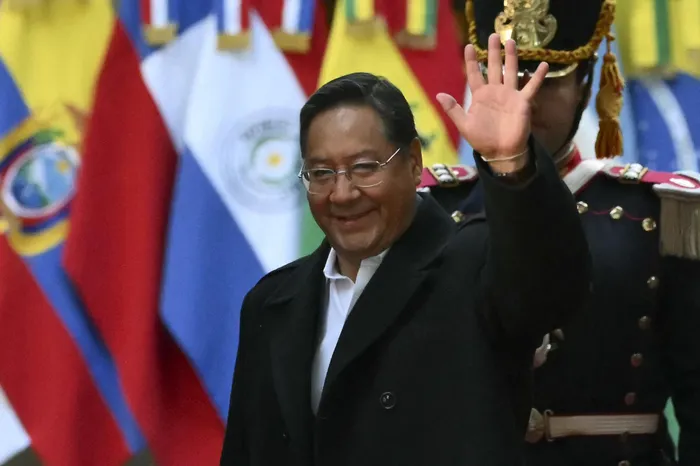BRICS+ Series: Luis Arce’s strategic withdrawal from Bolivia’s Presidential Contest

Bolivia's President Luis Arce Catacora waves on arrival for the 66th Summit of Leaders of Mercosur and Associated States at the San Martin Palace in Buenos Aires on July 3, 2025. The fate of a landmark trade deal with the European Union, which France is trying to block, loomed over a gathering of South America's Mercosur bloc. Brussels in December struck a deal with Mercosur's founding members to create a free trade zone of around 700 million consumers, though it still needs to be ratified by EU member states.
Image: AFP
Bolivia’s run‑up to the 17 August presidential election took an unexpected turn on Wednesday when President Luis Arce announced on social media that he would stand aside rather than risk splintering the left‑wing vote and enabling what he called a “fascist right‑wing project” to prevail. The same day, the Constitutional Court confirmed that Arce’s erstwhile ally and now rival, Evo Morales, remains barred from seeking a further term, citing the country’s two‑term limit.
A Presidency Marked by Strain
Elected in 2020 after Morales’s exile and the brief conservative interim government of Jeanine Áñez, Arce inherited a divided nation—and soon found himself at odds with Morales, the co‑founder of their Movement for Socialism (MAS) party. Economic headwinds have intensified public discontent: inflation is at a 10‑year high, foreign‑currency reserves are depleted, and the boliviano trades at roughly half its official rate on the black market. Once a gas exporter, Bolivia now imports fuel to meet domestic demand.
Arce has also faced pressure from the right: a delayed census in 2022 sparked deadly protests in Santa Cruz, while June 2024 brought an abortive coup led by army chief Juan José Zúñiga, Arce’s own appointee, who blamed the president for rising poverty. In Wednesday’s resignation post, Arce urged the left to unite behind a single candidate to “defeat the plunderers of Bolivia”.
Morales’s Defiance
Morales, Bolivia’s first Indigenous president, governed from 2006 to 2019 and twice defied term‑limit rules; his bid for a fourth term ended in the 2019 crisis that drove him abroad. Although the court has repeatedly reaffirmed the ban, Morales insists only “the people”—not judges—can ask him to step aside. He continues to command significant grassroots support despite allegations ranging from electoral fraud to a statutory‑rape investigation, which he denies. Reports say he remains in his power base in rural Cochabamba, surrounded by loyalists.
Election Outlook
With Arce out and Morales legally blocked, MAS may need to choose a new figurehead quickly if it hopes to retain the presidency. Meanwhile, a resurgent right and a fragmented left leave the August ballot wide open, injecting further uncertainty into Bolivia’s already volatile political landscape.
A report by the consultancy firm Control Risks notes that Evo Morales’ base has repeatedly shown it can disrupt the national economy through widespread protests and blockades. This pattern is expected to continue, posing challenges for any administration attempting to implement major reforms.
The report highlights that Bolivia’s current economic framework has been heavily influenced by Morales and the ruling MAS party. Despite recent political developments, Morales remains highly popular—especially among the country’s Indigenous majority, who make up around 62% of the population.
Civil unrest is likely to persist beyond the election, which could significantly hinder effective governance. Due to mounting protest pressure, any incoming government is expected to avoid pursuing the structural reforms necessary to tackle the country’s economic challenges. The report also underscores that Morales is likely to oppose any attempts to alter the political or economic system shaped by MAS.
Written By:
*Dr Iqbal Survé
Past chairman of the BRICS Business Council and co-chairman of the BRICS Media Forum and the BRNN
*Cole Jackson
Lead Associate at BRICS+ Consulting Group
Chinese & South American Specialist
** MORE ARTICLES ON OUR WEBSITE https://bricscg.com/
** Follow @brics_daily on X/Twitter & @brics_daily on Instagram for daily BRICS+ updates
Related Topics: